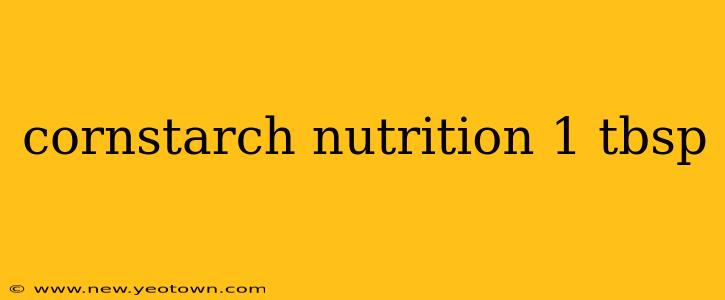Cornstarch, a ubiquitous pantry staple, often takes a backseat in discussions about nutrition. While not a nutritional powerhouse in the same vein as fruits and vegetables, understanding its nutritional profile can be surprisingly insightful, particularly for those watching their carbohydrate intake or seeking to understand the impact of thickening agents in their diet. Let's explore the nutritional content of a single tablespoon (approximately 15 grams) of cornstarch and delve into some frequently asked questions.
What are the calories in 1 tablespoon of cornstarch?
A single tablespoon of cornstarch packs approximately 55 calories. These calories are almost exclusively derived from carbohydrates, with negligible amounts of protein and fat. This makes cornstarch a purely energy-providing food, ideal for adding thickness and texture to recipes but not a significant source of essential nutrients.
Is cornstarch good for you?
This is a nuanced question. Cornstarch itself isn't inherently "bad" for you, but it's not a health food either. Its primary role is as a thickening agent, providing texture to sauces, gravies, and desserts. The absence of vitamins, minerals, and fiber means it doesn't offer significant nutritional benefits. However, its role in making food more palatable and enjoyable should be considered. Moderation is key; relying heavily on cornstarch as a dietary staple would be detrimental to overall health due to its lack of nutritional value.
What are the macros in cornstarch?
The macronutrient breakdown of one tablespoon of cornstarch is predominantly carbohydrates. It contains approximately 14 grams of carbohydrates, with virtually no protein or fat. This high carbohydrate content needs to be factored into any dietary plan, especially for individuals managing blood sugar levels or following low-carb diets. It's important to remember that these carbohydrates are primarily simple carbohydrates, which are digested quickly, leading to a rapid spike in blood sugar levels.
Is cornstarch gluten-free?
Yes, cornstarch is naturally gluten-free, making it a suitable thickening agent for those with celiac disease or gluten sensitivity. However, always check product labels to ensure no cross-contamination has occurred during processing.
What are the benefits of cornstarch?
While lacking in substantial nutritional benefits, cornstarch does offer some practical advantages:
- Thickening Agent: Its primary benefit is its ability to thicken liquids, creating smoother sauces, gravies, and puddings.
- Gluten-Free Option: A safe alternative for those avoiding gluten.
- Cost-Effective: Cornstarch is a relatively inexpensive thickening agent compared to some alternatives.
Does cornstarch contain any vitamins or minerals?
No, cornstarch is essentially devoid of vitamins and minerals. It's a refined carbohydrate that lacks the nutritional complexity found in whole grains or other nutrient-rich foods.
How does cornstarch compare to other thickening agents?
Cornstarch compares favorably to other thickening agents in terms of cost and effectiveness, particularly for its ability to thicken clear liquids. However, other options, such as arrowroot powder or tapioca starch, may offer slightly different textures and cooking characteristics. The choice often comes down to personal preference and the specific recipe's requirements.
In conclusion, while cornstarch offers practical culinary applications, it's crucial to view it as a functional ingredient rather than a nutritional powerhouse. Consuming it in moderation as part of a balanced diet is key to maintaining overall health and well-being. Remember always to consult a nutritionist or dietitian for personalized dietary advice.

